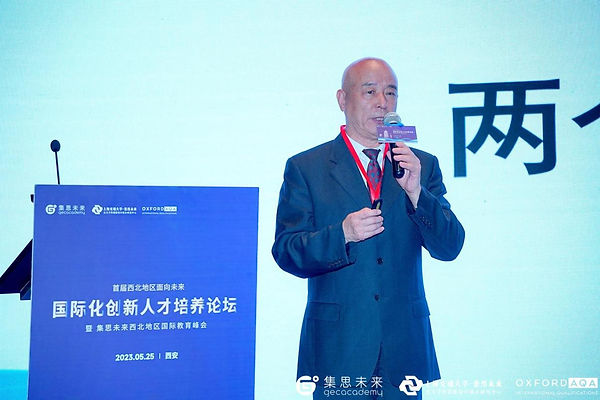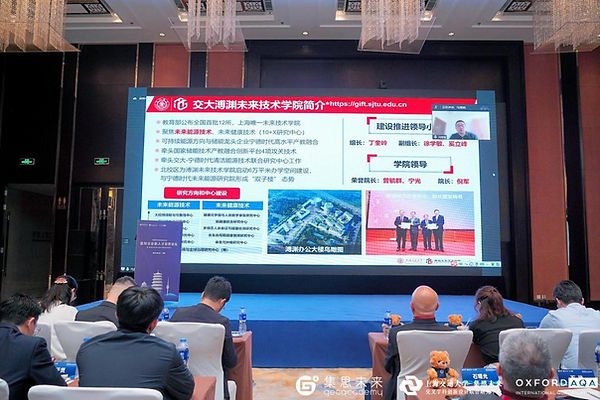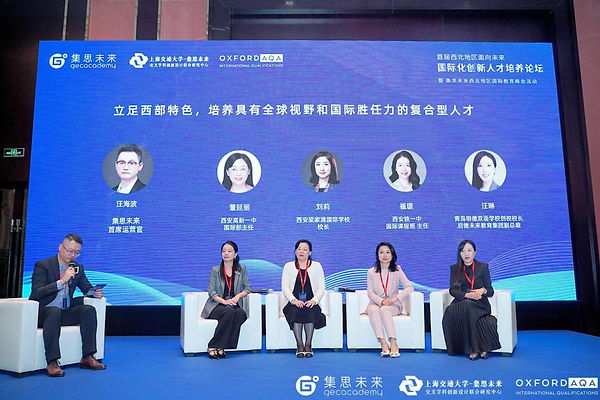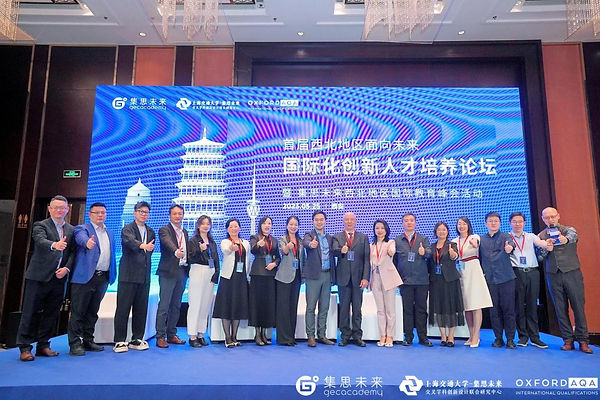
International Education Forum on Innovation Talent Cultivation for the Future & GEC Education Summit First Held in Western China
On May 25th, Xi'an played host to the first-ever International Education Forum on Innovation Talent Cultivation for the Future & GEC Education Summit in the western China area. Co-hosted by GEC Academy and SJTU - GEC Center of Innovative Design for Interdisciplinary Studies, and co-organized by OxfordAQA, this event saw over 200 distinguished educators, scholars, and representatives from various China and overseas universities, international schools, and international organizations gather to share their insights for international education development in the new era.
The forum employed a mix of keynote speeches and roundtable discussions to delve into key topics such as international innovation talent cultivation and global competence development, with a specific focus on ideas and experiences exchanges between international high schools and universities, given the unique industrial structure and talent development trends prevalent in the western region of China.
Mr. Sheng Yan, President of GEC Academy, delivered an opening speech for the forum, highlighting the significance of international innovation talent development in the new era. He also shared with the audience GEC's extensive experience in developing international and innovative talent through project-based and research-oriented learning over the past several years.

Mr. Sheng Yan giving an opening address for the forum
After the opening remarks, GEC's teaching faculty, Professor David Johnson, Chartered Educational Psychologist, Director of Oxford Education Analytics, and Professorial Fellow in St Antony's College at the University of Oxford, conveyed his warm greetings to all the attendees through online addresses.
Professor Johnson expressed his pleasure in welcoming attendees to the forum held in Xi'an, which he referred to as his favorite city in China. He stressed that "teachers are the lifeblood of the educational system. And attending this forum is an essential part of your personal and professional development. There is no better organization than GEC to facilitate your learning. I've been working with GEC for the last 2 years. And I've been thrilled to share ideas with many students and young professionals during this time. "
During the keynote speech, Mr. Zhijia Wang, who formerly held positions as the Director of International Cooperation at the National Environmental Protection Agency and as a Special Coordinator at the United Nations Environment Program, emphasized that global competence encompasses a wide range of capabilities, including the capacity to analyze regional, global, and cross-cultural issues, appreciate and understand different perspectives, engage in effective interactions with individuals from diverse cultural backgrounds, and take practice in collective well-being and sustainable development. He advocates for a well-rounded education that balances international perspectives with practical skills. "STEM students, in particular, should broaden their horizons by studying humanities, arts, and philosophy to better engage with the world beyond academia. Crucial competencies such as communication, teamwork, and innovative thinking are highly valued by both domestic and international employers. Innovation cultivation will be essential for achieving success upon the foundation of current accomplishments in the post-pandemic era. Therefore, it is imperative to encourage students to develop this skillset.", he stated.

Mr. Zhijia Wang giving a keynote speaking on global competence development
Dr. Xiaoli Fan, Dean of Queen Mary College at Northwestern Polytechnical University, discussed the engineering college's approach to cultivating international talent. She pointed out some of the challenges faced by universities in this area, including the rigidification of teaching models and outdated educational philosophies.
Mr. Chengbin Ma, Assistant Dean of the Global Institute of Future Technology at Shanghai Jiao Tong University, believes that a significant shift in mindset is necessary for cultivating talent. Rather than taking a teacher-centered and subject-focused approach, he suggests adopting a student-centered and question-oriented approach. This approach prioritizes individual students' needs and aims to develop innovative, research-oriented talents. According to Mr. Ma, "modern science and technology are characterized by large-scale interdisciplinary development and the ultimate goal of engineering education is to apply knowledge to practice, which requires creating an immersive environment for shared learning and living. Therefore, it is essential to establish a conducive learning and living environment for students and foster a culture of communication and collaboration. By doing so, we can ensure that future generations of engineers and scientists have the skills and knowledge necessary to solve 'bottleneck' problems and make significant contributions to society. "

Mr. Chengbin Ma introducing the Global Institute of Future Technology
at Shanghai Jiao Tong University
The event then proceeded into three illuminating roundtable discussions. Over ten esteemed principals and educators from China international schools participated in these thought-provoking discussions, which delved into several key topics.
The first discussion focused on cultivating versatile talents with robust global perspectives and intercultural competencies, as well as their efforts in cultivating talent. They also engaged in lively discussions about how schools can assist children in adapting to the changes brought by the era of artificial intelligence and prepare them for the future. Ms. Li Liu, Principal of Xi'an Liangjiatan International School, emphasized that in the age of information technology, it is crucial for educators to help children improve their data processing and critical thinking skills. This will enable them to effectively use information and accelerate the development and progress of society.

Mr. Haibo Wang, COO at GEC Academy, hosting the first roundtable discussion
While discussing the challenges and innovations inherent in integrating curriculums within international schools, Ms. Qingqing Duan, the International Department Director at Yinchuan No.1 School Affiliated to Jiaotong University in China, emphasized the need for high-quality teachers who possess a thorough understanding of both local and international curricula. She also noted, "parental attitudes towards education can vary, making effective communication between educators and parents crucial in addressing any concerns or reservations about the curriculum. "
The final roundtable explored ongoing trends in admissions for overseas universities. The panelists discussed the types of students that are highly sought after by international institutions, including those with exceptional specialized skills and a well-rounded range of abilities spanning academics, sports, and arts. They also shared strategies for addressing the impact of the pandemic on international education and preparing students for a future that is rapidly changing.

A group photo of some of the guest speakers after the forum
This forum provided valuable insights and strategies for addressing the challenges facing current international education and offered new ideas for developing innovative and versatile talent in a rapidly changing world. With the objective of providing new perspectives and approaches for international education, GEC Academy is committed to seeking opportunities in promoting international education development and continuing to explore new perspectives and approaches together.